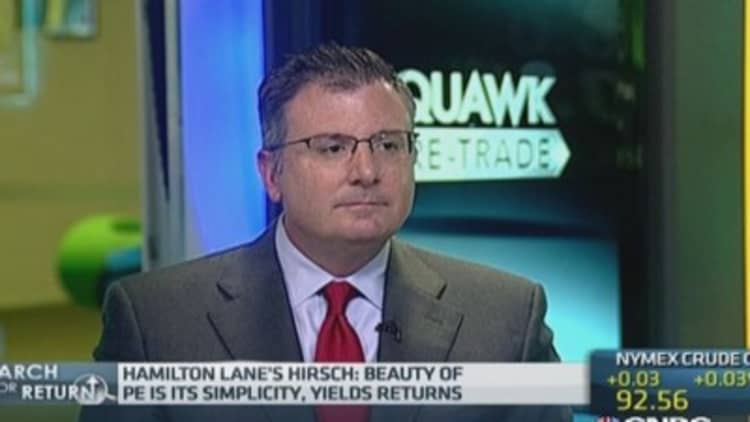Enterprise tech start-ups are on fire. Every day it seems there's at least one mega financing in a company that's taking on the incumbents with a faster and more efficient, sleeker and more cost-effective solution.
Just this week, data analytics start-up Alteryx raised $60 million and high-performance storage provider SolidFire reeled in $82 million. It's a race to acquire customers and, in many instances, grow at the expense of profitability. And it's being funded by an exuberant venture capital community.
Bob Morse has chosen not to play that game. After spending 12 years investing in technology companies at private equity firm Oak Hill Capital, Morse noticed a corner of the business software market that remains largely ignored by the popular bankrollers. He started Strattam Capital last year and is raising $350 million fund to go after those deals.
Rather than seeking out the next big disruptive force that's doubling revenue every year and aiming to take down Oracle or IBM, Strattam is looking for lower-profile software companies that have stayed away from traditional venture capital and stuck with more conservative growth rates.
Read MoreWhat bubble? Legacy tech gets shut out
Morse said that by providing some fresh capital and professional guidance, Strattam can help companies that have been growing at 10 to 15 percent a year increase that to 20 to 25 percent. And he can help get them on the radar of big tech companies that have noticeable gaps in their product suite.
Strattam's first deal, which closed last week, was for a majority stake in Doxim, a 14-year-old Toronto-based company that sells electronic document management tools to financial firms. Prior to meeting Strattam, Doxim had raised a total of $500,000 in outside funding in 2006. With that, the company reached $10 million in annual revenue, turned a profit and hired almost 100 employees.
"I don't have anything in my plan that's 100 percent growth every year," said Chris Rasmussen, Doxim's founder and chief executive officer. "I've been able to guide the company from the home office in the basement of my house to where we are today by making short, medium and long-term decisions. Now I've got a few more veterans on my board."

The deal was more private equity than venture capital, with Strattam gaining control and Doxim's executive team keeping a minority stake. Terms weren't disclosed, but Morse said Strattam will generally write checks ranging from $25 million to $50 million for majority ownership. The website says the firm invests in companies with enterprise values of up to $150 million.
Morse is the first to admit that he's not expecting blockbuster initial public offerings for his companies (though he wouldn't oppose them). By helping double the growth rates of companies with $10 million or so in annual sales and by using his rolodex to introduce little-known businesses to big industry players, any number of doors can open. That can include making companies more attractive and more visible acquisition targets.
"Corporations like to buy businesses they know," said Morse, who's based in Austin, Texas. Small software companies "don't tend to have close relationships with big strategics."
Morse has those relationships thanks to a career in tech investing. While at Oak Hill, he was part of a team that backed data center businesses like Savvis, TelecityGroup and ViaWest. His co-founder, Adrian Polak, was also a senior advisor at Oak Hill and is based in San Francisco.
There's certainly no shortage of competition in tech private equity, but most of the notable players like Silver Lake and Vista Equity Partners make much larger investments. Because they have many billions of dollars under management, the smaller deals don't move the needle for them. Meanwhile, venture capitalists are investing at rates not seen since the dot-com bubble, though not in the types of companies Morse is finding.
Read MoreVenture capital raised $8.9 billion in Q1
Doxim plans to use the capital to expand its U.S. presence, including its recently opened New York office. Given that the company sells products like content management systems, document imaging technology and tax processing tools to financial firms, the market opportunity is many times bigger in the U.S.
If Morse's thesis is right, he'll see plenty of deal flow in the small, unsexy side of the software market.
"We were excited that we were going to be able to be their first significant investment as a platform to grow for the future," Rasmussen said.
Correction -- This story has been updated to reflect Adrian Polak's title at Oak Hill, and current status of Strattam's fundraising.


